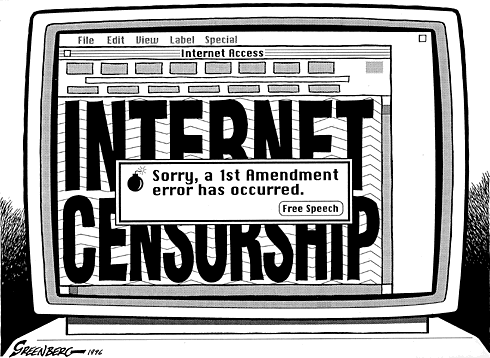
UPDATE 6/30/2016: The Authors Guild, an authors advocacy organization, reached out to NCAC to offer an alternate perspective on the US Copyright Office's inquiry into amending the Section 512 of the DMCA. Executive Director Mary E. Rasenberger explained that the inquiry is necessary because in its current form Section 512 simply doesn't work. For instance, the "notice and takedown" procedure does nothing to protect authors, whose livelihood relies on a protected copyright of their work, because of its lack of protections on the reuploading of copyright infringing content. She said that while there are certainly cases when Section 512 is used to curtail free speech, such incidents are "one in fifty million." The poverty of struggling authors, Ms. Rasenberger argued, is more of a censorship issue than changes to the DMCA.
Original post:
For many of us in developed societies, our virtual existence has become crucial to our day to day functioning. Whether we are at work or relaxing at home, our livelihoods and interactions are now more than ever played out online. This has led to the increasing significance of a clause in the Digital Millennium Copyright Act (DMCA), a law enacted in 1998 by the U.S' Copyright Office that allows a piece of copyright infringing online content to be taken off the web. The clause, found in Section 512 of the DMCA, allows a content owner who discovers illegal use of their copyrighted work to issue a "notice and takedown" warning to the offending website or internet user. According to The Internet Archive, a non-profit online library of books, movies and other media, no legal action is necessary to file a succesful takedown. The "mere accusation of guilt" is enough.
The clause evidently has a great deal of power in its capacity to silence and censor content, irrespective of whether a copyright is found to be legitimately infringed. However, a proposed change to the takedown procedure threatens not only to increase this power, but also encroach on an individual's freedom of expression on the internet.
In its current state, Section 512 can be abused by the parties on either side of a given warning. The "notice and takedown" warning, for example, does nothing to prevent the offending party from re-uploading the copyright infringing content. And conversely, as mentioned above, it provides basically anyone with the means to shut down content, regardless of its copyrighted status. Indeed in 2013, Wired reported on a San Francisco news station that invoked the DMCA clause to remove a YouTube clip of an on-air reporting blunder.
There are, however, checks on the current power of the clause. Legal action, for example, can be taken if an infringing piece of content is repeatedly re-uploaded. Those who are hit with an illegitimate notice are also able to appeal the copyright claim. (This was the case with the San Francisco news station and the clip remains online).
Nonetheless, to address the shortcomings of the "notice and takedown" process, The Internet Archive reports that The Copyright Office, beginning in May, is conducting a review of the Section 512 clause of the DMCA .
In a blog post, The Archive highlights a troubling proposal to change the copyright procedure from "notice and takedown" to "notice and staydown." The tightened ruling would prevent a copyright infringing piece of content from forever returning to the web, raising questions about the impact the new procedure would potentially have on online censorship.
If, for example, an internet behemoth like Facebook or YouTube was hit with a "notice and staydown" claim, the website would have to actively monitor its millions of users who upload to the site to ensure that the offending clip or piece of content did not reemerge. Aside from this being enormously time consuming, such a process would eliminate a user's right to appeal the copyright strike, because it was the website not the individual who received the initial notice. By simply policing the uploaded content, a website is able to censor its users without any formal review process. Thus, even prior to a clip or piece of content being uploaded and shared, an internet user's freedom of expression can be taken away.
Citing other concerns such as the cost of policing for smaller content hubs, The Archive questions whether The Copyright Office grasps the implications of the stricter measure on the wider internet and its users. A "notice and staydown" procedure, it concludes, "would be an absolute disaster."

